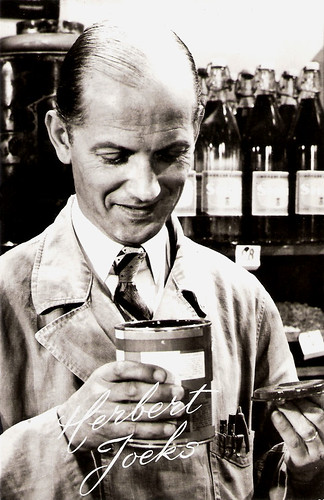Dutch postcard. Photo: Godfried de Groot, Amsterdam.
Dutch postcard by Gebr. Spanjersberg N.V., Rotterdam. Sent by mail in 1969. Photo: Herbert Joeks in Pipo de clown.
A sexton in love
Herbert Joeks was born as Herman Jozef van Hugten in Amsterdam in 1915.
He started his career in amateur theatre. In 1943 he could avoid to have to go to Germany for the Arbeitzeinsatz (forced labour) by working as a professional singer and actor for the Trianon Cabaret.
After the war he performed for Canadian soldiers and they accidentally gave him his stage name. They pronounced his surname Hugten as ‘Hughes’. In Dutch this is phonetically written as ‘Joeks’. So as Herbert Joeks he went to work for several cabaret companies and often performed for the radio.
During the 1950s he also appeared in a number of Dutch films. He played supporting parts in the comedies Sterren stralen overal/Stars Twinkle Everywhere (Gerard Rutten, 1953) as a sexton in love, and Het wonderlijke leven van Willem Parel/The Wondrous Life of Willem Parel (Gerard Rutten, 1955) as a hard-of-hearing radio director.
A huge success was the comedy Fanfare (Bert Haanstra, 1958) about two competing brass-bands in the fictional village of Brederwiede. Joeks appeared also in Haanstra’s next film, De Zaak MP/The M.P. Case (Bert Haanstra, 1960), but this comedy proved to be a huge flop.
From 1955 till 1958, Joeks was a permanent member of the acting company of the upcoming Dutch television. The first years he appeared in several TV adaptations of famous books and plays, such as Charles Dickens’ De geest van kerstmis/A Christmas Carol (1958) in which he played an acclaimed Scrooge.
With his small, frail figure, his early balding head and close mouth, and his shrill, slightly narrowed voice he usually performed the same kind of characters: a priest, a notary, a shopkeeper or just a little frightened bourgeois.

Dutch postcard by Uitgeverij Takken, Utrecht, 3793. Photo: Jutka Mol, Rome. Publicity still for Fanfare (Bert Haanstra, 1958).
Dutch postcard by Gebr. Spanjersberg N.V., Rotterdam, no. 3. Photo: Herbert Joeks in Pipo de clown.
Dutch postcard by Gebr. Spanjersberg N.V., Rotterdam. Sent by mail in 1968. Photo: Herbert Joeks in Pipo de clown.
The Indian Who Always Shot Wrong
Herbert Joeks’ biggest TV success was the children’s series Pipo de clown/Pipo the Clown (Henk Barnard a.o., 1958-1980). It was an exciting, fairy-tale like adventure about Pipo the clown (Cor Witschge) and his wife Mamalou.
Pipo and Mamalou were travelling around in a 19th century circus wagon, pulled by a single mule called Nononono. They and their friends were faced with all sorts of problems and dangers.
Their best friend was the fearful Indian Klukkluk, who always shot wrong. As Klukkluk he conquered the hearts of many generations of children. He spoke a self-made language and introduced new words to the Dutch language.
In 1975 Joeks also appeared as Klukkluk in the cinema in the feature film Pipo en de piraten van toen/Pipo and the Pirates of the Past (Kees van Eyk, 1975), filmed on the Caribbean island of Aruba.
The last episode (number 118) of the series was shown in 1980. Meanwhile Joeks appeared in several other TV films and series. During the 1960s he played supporting parts in such children’s series as Bas Boterbloem/Bas Butterflower (Gerrit den Brabander a.o., 1960) and De Avonturen van Okkie Trooy/The Adventures of Okkie Trooy (Bram van Erkel, 1962).
Joeks also appeared in comedy series like Herrie om Harrie/Here’s Harry (Willy van Hemert, 1963) and Tot de dood on scheidt/Till Death Do Us Part (1970), and in the popular drama series Joop ter Heul (1968), Klaverweide/Clover Meadow (1973) and Hollands Glorie/Dutch Glory (Walter van der Kamp, 1975) based on the 1940 novel by Jan de Hartog.
However he is best remembered for his work in children’s series. Later series were Kunt u mij de weg naar Hamelen vertellen, meneer?/Could You Tell Me the Road to Hamelin, Sir? (1972), and Familie Oudenrijn/The Oudenrijn Family (Bob Spiers, Wouter Stips, 1985).
His last film role was as a patient in the comedy De Boezemvriend/The Bossom Buddy (Dimitri Frenkel Frank, 1982) starring Dutch comedian André van Duin, and his final TV role was also as a patient in the soap Medisch Centrum West/Medical Centre West (1991).
Sadly, he became in private a patient too. In 1993, Herbert Joeks died in Amsterdam of complications of cancer, at the age of 77. He was married to Fransje van Balkom and they had a daughter, Madeleine.
Dutch postcard by Gebr. Spanjersberg N.V., Rotterdam. Sent by mail in 1969. Photo: Herbert Joeks in Pipo de clown.
Dutch postcard. Photo: Herbert Joeks in Pipo de clown.
Sources: A.J.C.M. Gabriëls (Huygens ING), Wikipedia (Dutch) and IMDb.
No comments:
Post a Comment